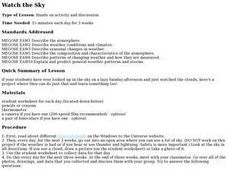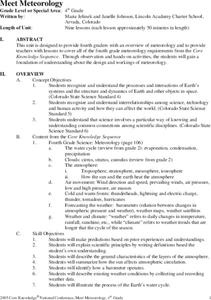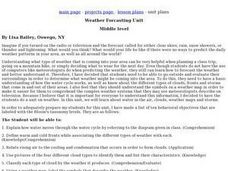101 Questions
Lightning then Thunder
Conquer your fear of thunder and proportions. After viewing a video of lightning and thunder, scholars consider how far away the storm is from the recorder. This obviously requires the use of proportions and rates.
Curated OER
Lightning!
Students use aluminum, a thumbtack, an eraser, and more to create static electricity. In this static electricity lesson plan, students use this experiment to simulate lightning.
Curated OER
Lightning
Students uncover the science behind lightning and thunder.Theyexamine electrical attraction between like and unlike charges, and the force that creates lightning, is first explained using static electricity.
Curated OER
Lightning
Students study lightening and the history behind how it was used for electricity. In this electricity lesson students complete several experiments on the invention of the lightning rod.
Curated OER
Making Lightening: In Your Mouth
Learners look at a lightening demonstration. In this lightening lesson, students bite into a wintergreen candy while looking in the mirror in a dark room. They see sparks in their mouths if they perform the task correctly.
Curated OER
Lightning and Thunder
Students conduct an experiment. In this lightning and thunder lesson, students learn how to figure out how far away a thunderstorm is.
Curated OER
Stormy Weather
Students conduct experiments. In this weather lesson, students review what they know about weather elements such as cloud formation and storms. Students conduct demonstrations and learn how lightning strikes.
Curated OER
LIGHTNING MYTHS AND FACTS
Students compose lightning safety rules and explore facts and fiction about lightning. They examine the cause of lightning when a channel nears an object on the ground, a powerful surge of electricity from the ground moves upward to the...
Curated OER
Storms and Extreme Weather
Students explore hurricanes and tornadoes by conducting an experiment. For this weather pattern lesson, students define many extreme weather vocabulary terms and discuss the relationship with static electricity. Students utilize plastic...
Curated OER
Stormy Weather
Students conduct various experiments to explore the concepts that static electricity is the cause of lightning.
Curated OER
Lightning and Thunder
In this lesson, 5th graders begin to describe the atmosphere;describe weather conditions along with seasonal changes. Students further explain safety precautions during severe weather and go onto Describe patterns of changing weather...
Curated OER
Watch the Sky
Students describe the atmosphere, weather conditions, and climates. They describe seasonal changes in weather, the composition and characteristics of the atmosphere. Students describe patterns of changing weather and how they are...
Curated OER
Twister Redux
Students pick up science knowledge as they track and examine natural disasters. They keep a daily journal of results and reflections. Students get to follow a real tornado chaser and learn thunderstorm formation. They incorporate how...
Curated OER
Meet Meteorology
Students explore meteorology, discuss Earth's atmosphere, create drawings of the water cycle, create meteorology journals, and role play forecasters. Nine lessons on one page; includes unit test.
Curated OER
Classroom Meteorologists: An Experiential Approach to Learning about Seasons and Weather
Students examine several concepts about weather in the seven lessons of this unit. This year long activity helps students to gather data seasonally about wind, clouds, precipitation, and temperature. Earth's three climate zones are...
Curated OER
Weather Forecasting Unit
Students study weather concepts, mapping, characteristics in this series of lessons.
Curated OER
Static Cling
Fifth graders examine the principles of static electricity and positive and negative charges. They observe and then perform experiments with static electricity. They record examples in their journals.
Curated OER
Twisters
Students build a tornado in a bottle and do various readings to explore tornadoes.
Curated OER
A Cloud In The Hand
Students investigate the scientific concept of forming clouds. The use simple materials to simulate the formation. This creates a powerful visual for students to make cognitive connections. They make observations and record them in a lab...


















